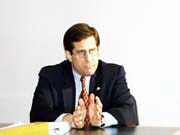Secaucus officials have expressed concern that bigger jets landing at Teterboro airport will mean more sleepless nights for local residents as the noise levels increase.
Councilman Robert Kickey informed the Town Council last month about a proposal by Boeing Corporation, the manufacturer of jet aircraft, to land aircraft far in excess of the current weight restrictions.
Earlier this year, Boeing appealed rejections from the airport and the New York/New Jersey Port Authority, which oversees the airport to the Federal Aviation Administration, seeking to land craft that exceed the 100,000-pound restriction.
Congressman Steve Rothman (D-21st Dist.) has raised options to the move, and hoped to head off a ruling by the FAA in favor of Boeing with appeals of his own to reject the request.
Councilman John Bueckner said he is concerned about the power of the FAA to override local objections is frightening.
“They could ram this thing down our throats,” Kickey said.
Teterboro and the Port Authority imposed 100,000-pound weight limit because the runways were not constructed to handle such heavy aircraft. Boeing Business Jet, at 174,000 pounds, is one of the heaviest planes in that class of planes and cannot land there.
Boeing has filed a complaint with the FAA, saying the airport’s restriction hinders its ability to market its planes, and that the weigh limit is not a FAA restriction, but one imposed by the Port Authority.
The Port Authority, however, said the airport cannot handle the heavily planes on a day-to-day basis.
Rothman and a bipartisan coalition of elected and community leaders went to Washington D.C. earlier this year make their opposition known to the FAA. Boeing Business Jet is seeking to overturn the ban in place since 1967. “This jet represents a serious safety hazard because Teterboro Airport is not designed or equipped to handle air craft over 100,000 pounds,” Rothman said.
Rothman said the structural limitations of the pavement of the runways will not handle the heavier craft. Boeing has sought to get the weight limits lifted in the past, but Rothman fears this latest effort could begin the slow slide that would bring heavier jets routinely into Teterboro.
Rothman and his group asked the FAA to refuse Boeing, because he feels this would lead the way to even larger aircraft in the future.
Rothman said there has been an extraordinary increase in yearly jet operations at Teterboro Airport from 62,985 in 1995 to 103,816 in 1999.
This 60 percent increase in traffic has also brought an increase in noise cover residential areas in Secaucus, Carlstadt and other towns along the flight path of landing aircraft.
Last year, Rothman led opposition against nighttime flights in and out of Teterboro, largely because of the noise, seeking to have such flights banned.
According to the Federal Aviation Administration, 60 to 70 flights land at or depart from Teterboro Airport between the hours of 11 p.m. and 7 a.m. each day, most of which are small turbo propeller planes or small corporate jets. The corporate jets generally weigh less than 75,000 pounds and may therefore still use older “stage 2” type engines, which are approximately 50 percent louder than the more modern “stage 3” version. Tests done for the federal government show that exposure to excess noise over a long period of time does more than just rattle people’s nerves – it can increase blood pressure and stress hormone levels.
Federal authorities said the nature of Teterboro Airport’s traffic has changed over the last few years, with larger jets and more corporate jet activity. Combined with airline traffic from Newark International Airport, Teterboro Airport, and LaGuardia and Kennedy Airports over the residential communities of northern New Jersey, there is “an intolerable level of aircraft noise for residents of these communities,” according to legislation proposed to limit nigh time traffic.
